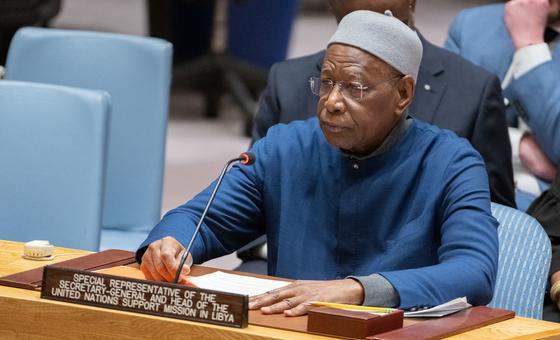As the oil-rich North African nation continues to be ravaged by instability and clashes between rival authorities and armed groups, the Council’s statement outlined some of its pressing concerns.
Libyan-owned process
Members reaffirmed their strong commitment to an inclusive, Libyan-led and Libyan-owned political process, facilitated by the UN and supported by the international community. It also expressed its strong support for the people of Libya to determine who governs them through elections and to ensure this legitimate demand is heard by political leaders.
The Council called on the international community to fully support the UN Secretary-General’s Special Representative and the UN mission (UNSMIL) in its efforts to address challenges ahead.
Addressing the Council late last month, UN Special Representative and head of UNSMIL, Abdoulaye Bathily, said that the fragile political process was still falling far short of Libyans’ aspirations, adding that they were crying out for reinvigorated political institutions. He announced a new mechanism for supporting crucial upcoming elections.
Multilateral approach
Towards finding a lasting and peaceful solution to the Libyan crisis, the Council encouraged the Special Representative to continue to take advantage of the contributions of neighbouring countries and regional organizations, in particular the African Union and the League of Arab States.
The 15-member organ encouraged the UN’s continued support to the Libyan High National Elections Commission, including the deployment of a needs assessment mission, with a view to ensuring free, fair, transparent and inclusive national presidential and parliamentary elections across Libya.
Recalling the need to plan for security sector reform and to progress towards the demobilization, disarmament and reintegration of armed groups, as agreed by the 5+5 Joint Military Commission in December – made up of officials from both the internationally recognized Government and the rival administration in the east – the Council underscored the need for the establishment of an inclusive, unified, accountable, civilian-led security architecture for Libya as a whole.
It also underlined the importance of the principles of financial responsibility, anti-corruption, and transparency in the context of elections.

In Benghazi, Libya, widespread destruction is a reminder of years of conflict.
Strengthen borders
Reiterating its grave concern about the smuggling of migrants and refugees and human trafficking through Libya, and at the situation faced by migrants and refugees, including children, the Council recalled the need to support further efforts to strengthen Libyan border management.
It also called on Libyan authorities to respect and protect the human rights of migrants, and to take steps towards the closing of migrant detention centres.

